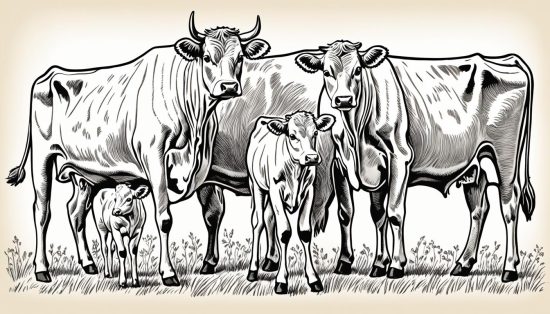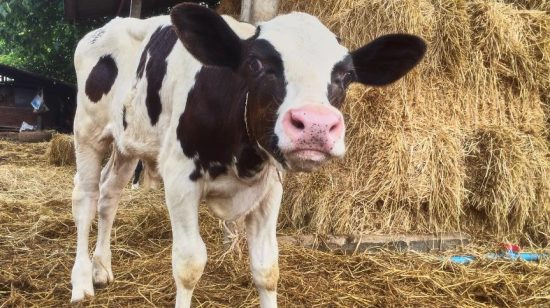How Much Does a Cow Weigh? Find the Average Weight Here
Curious about bovine sizes? Learn how much does a cow weigh and discover the factors that affect their average weight in our detailed guide.
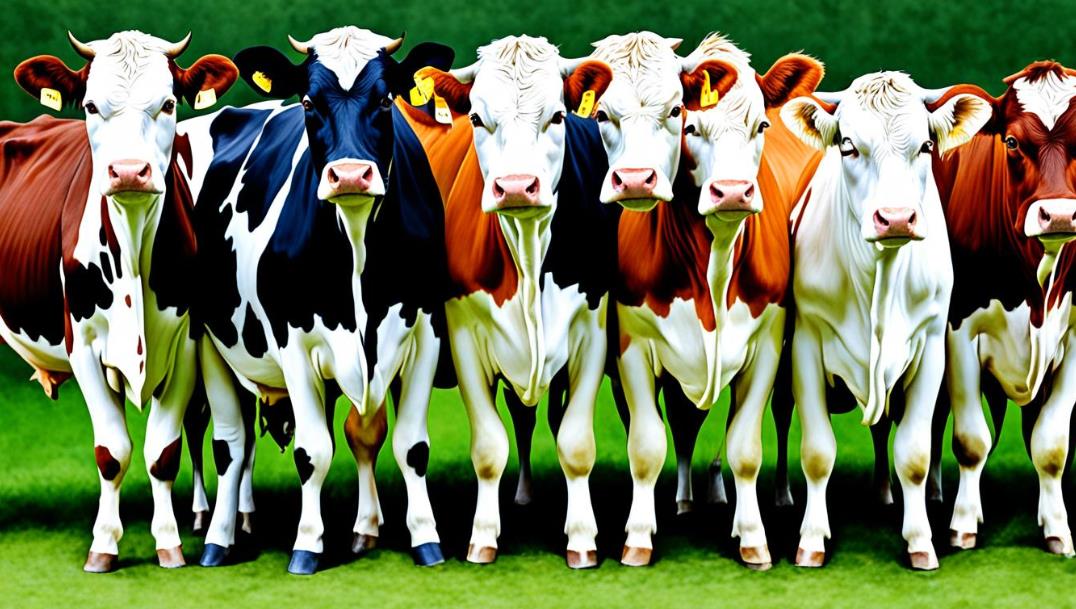
Did you know that the average weight of a mature cow is a staggering 1,400 pounds? That’s equivalent to the weight of a small car!
Cow weight can vary significantly depending on various factors such as breed, age, and gender. We will delve into the fascinating world of cow weights. We will explore the variations in weights across different breeds, examine the factors that affect cow weights and growth rates, take a closer look at beef cattle weights, analyze the significance of cow size in livestock management, and discuss the average weights across different cow categories.
Additionally, we will uncover how livestock specialists assess and utilize cow weights, gaining insights into their importance and role in the industry. Lastly, we will explore the largest and smallest breeds of cows, discovering their unique characteristics and uses. Get ready for an eye-opening journey into the world of cow weights and gain a deeper understanding of these magnificent animals.
Understanding Cow Weight Variations by Breed
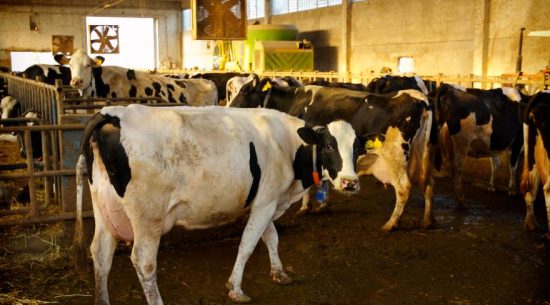
Different cow breeds can have varying average weights. The breed of a cow plays a significant role in determining its size and weight. Some breeds, such as the Chianina, are known for their large size and can weigh up to 3,500 pounds. On the other hand, smaller breeds like the Vechur can weigh around 300 pounds.
Each breed has its own unique characteristics that contribute to its weight variation. Factors such as bone structure, muscle mass, and metabolism can influence the weight of a cow. Additionally, the purpose for which a breed is selected, whether it be for meat, milk, or both, can also impact its average weight.
The Impact of Breed on Average Cow Weight
Breed-specific traits greatly influence the average weight of cows. Some breeds have been selectively bred over generations to maximize size and weight for improved efficiency in meat or milk production. These selectively bred breeds, often referred to as “heavy-weight” breeds, can have significantly larger average weights compared to other breeds.
For example, the Charolais breed is recognized as one of the heaviest beef cattle breeds, with average weights ranging from 1,500 to 2,500 pounds. On the other hand, the Jersey breed, known for its dairy production, has an average weight of around 900 to 1,200 pounds.
Genetic characteristics, such as growth rates and feed efficiency, also contribute to weight variations among different breeds. Breeds with faster growth rates and efficient feed conversion tend to have higher average weights.
Comparing Heaviest and Lightest Cow Breeds
When comparing the heaviest and lightest cow breeds, the differences in average weight become evident. While the Chianina breed is known to be one of the heaviest, weighing up to 3,500 pounds, the Vechur breed holds the distinction of being one of the smallest, with an average weight of around 300 pounds.
Table:
| Cow Breed | Average Weight (pounds) |
|---|---|
| Chianina | 3,000 – 3,500 |
| Charolais | 1,500 – 2,500 |
| Simmental | 1,200 – 2,200 |
| Vechur | 250 – 300 |
These weight variations reflect the diverse needs and priorities of the agricultural industry. Larger breeds may be favored for their meat yield, while smaller breeds may be preferred for their ease of handling or suitability to specific environments.
Factors Affecting Cow Weights and Growth Rates
When it comes to the weight of cows, several factors come into play. Understanding these factors can provide valuable insights into managing cow sizes and optimizing growth rates for livestock management. We will explore the genetic and nutritional influences on cow size and how age and gender contribute to cow weight.
Genetic and Nutritional Influences on Cow Size
The size and weight of cows are significantly influenced by their genetic makeup. Different breeds have varying genetic predispositions, with some breeds naturally larger than others. Breeders selectively breed cows to enhance specific traits related to size, contributing to the differences in weights among breeds. Additionally, nutrition plays a crucial role in the size and weight of cows. A well-balanced diet, rich in essential nutrients, is vital for healthy growth and weight gain. Adequate access to quality feed can ensure that cows reach their full growth potential and maintain optimal body condition.
How Age and Gender Contribute to Cow Weight
The age and gender of a cow can significantly impact its weight. In general, older cows tend to be larger and heavier compared to younger ones. As cows age, they go through growth and development stages that contribute to their overall size. Gender is another crucial factor. Male cows, or bulls, are typically larger and heavier than female cows, or heifers. This difference is due to hormonal influences and the natural purpose of bulls to be more robust and muscular for breeding purposes.
| Factor | Impact on Cow Weight |
|---|---|
| Genetic Influences | Different breeds have varying natural sizes, contributing to differences in weights. |
| Nutritional Influences | A well-balanced diet is crucial for healthy growth and weight gain in cows. |
| Age | Older cows tend to be larger and heavier than younger ones. |
| Gender | Male cows (bulls) are generally larger and heavier than female cows (heifers). |
Understanding the factors that affect cow weights and growth rates is essential for effective management and optimization of livestock. By considering genetic influences, providing adequate nutrition, and acknowledging the impact of age and gender, farmers and ranchers can make informed decisions to ensure healthy and well-sized cows.
How Much Does a Cow Weigh
The weight of a cow can vary depending on several factors. On average, a mature cow weighs around 1,400 pounds. However, specific breeds or individual cows may weigh more or less than this average. It is important to consider factors such as breed, age, and gender when determining the weight of a cow.
Here, you can find some examples of the average weights of different cow breeds:
| Breed | Average Weight (pounds) |
|---|---|
| Angus | 1,200 – 1,500 |
| Hereford | 1,200 – 1,600 |
| Charolais | 1,400 – 1,800 |
| Simmental | 1,400 – 1,800 |
As you can see, even within specific breeds, there can be a range of weights. This variation is influenced by factors such as genetics, nutrition, and management practices. It is important for livestock owners and managers to monitor the weight of their cows to ensure their overall health and productivity.
A Closer Look at Beef Cattle Weights
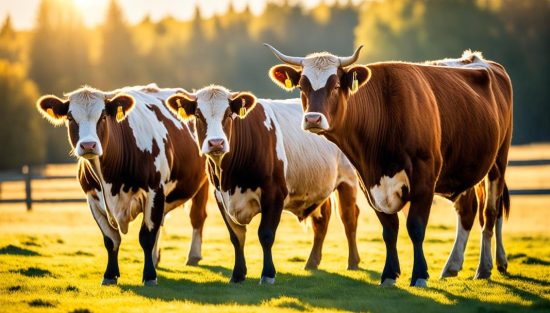
When it comes to beef cattle, weight is a crucial factor in meat production. Due to their specific breeding purposes, beef cattle tend to have larger frames and heavier weights compared to dairy cattle. Understanding the weights of different beef cow breeds can provide valuable insights into their growth patterns and potential meat yield.
To delve deeper into the world of beef cattle weights, let’s take a closer look at some of the popular beef cow breeds and their average weights. The table below showcases the average weights of Angus, Hereford, Charolais, and Simmental breeds, which are well-known for their meat quality and market demand.
| Breed | Average Weight (pounds) |
|---|---|
| Angus | 1,200 – 1,500 |
| Hereford | 1,200 – 1,600 |
| Charolais | 1,300 – 1,800 |
| Simmental | 1,400 – 1,800 |
The data above highlights the average weight ranges of these beef cattle breeds. However, it’s important to note that individual animals within each breed can vary in weight due to factors such as genetics, nutrition, and management practices. Livestock specialists closely monitor and manage these factors to ensure optimal weight gain and meat production. The beef cattle can range in weight depending on the breed. Understanding these weight variations can help farmers and livestock specialists make informed decisions regarding breeding programs, feed requirements, and overall herd management. By focusing on maintaining healthy weight ranges, farmers can maximize meat production and contribute to the efficiency of the beef industry.
The Significance of Cow Size in Livestock Management
The size of a cow is of great importance in the field of livestock management. The weight of a cow plays a crucial role in determining its overall health and well-being. Properly managing the weight of cows is essential for ensuring their long-term health and optimizing their productivity.
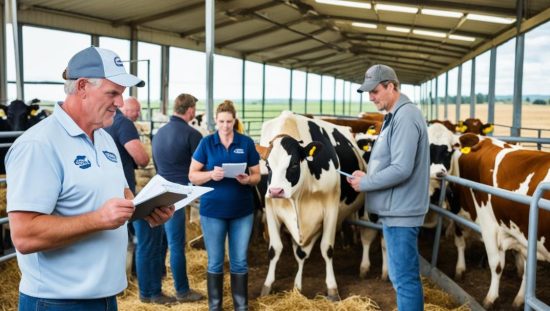
Managing the weight of cows is key to optimizing their health. Maintaining cows at an optimal weight can help prevent various health issues and promote overall well-being. By closely monitoring the weight of cows, livestock managers can identify any fluctuations or deviations from the ideal range and take appropriate measures to address them.
Weight management also involves ensuring that cows receive a balanced and nutritious diet. Providing the right amount of feed, including proteins, minerals, and vitamins, is crucial to support the growth and development of cows. Additionally, regular exercise and access to clean water are important components of weight management for cows.
Strategic Feeding Practices for Weight Control
Implementing strategic feeding practices is essential for controlling the weight of cows. This involves developing a feeding regimen that is tailored to the specific needs of the cows and takes into consideration their size, age, and stage of production. By adjusting the feed intake and composition, livestock managers can effectively manage the weight of cows. Strategic feeding practices may include providing a balanced diet that meets the nutritional requirements of cows without leading to excess weight gain. This may involve feeding cows based on their body condition score and adjusting the feed ration accordingly. Regular monitoring of feed consumption and body weight can help ensure that cows are receiving the right amount of feed to maintain a healthy weight.
Furthermore, optimizing the timing and frequency of feeding can also contribute to weight control in cows. Splitting the daily feed into smaller, more frequent meals can help prevent overeating and promote better digestion. Balancing energy intake and expenditure through strategic feeding practices can help maintain optimal body condition and improve overall cow health.
| Benefits of Cow Size and Weight Management | Optimizing Cow Health | Preventing Health Issues | Improving Productivity |
|---|---|---|---|
| Proper weight management promotes optimal health and well-being for cows. | Maintaining cows at an optimal weight helps prevent various health issues such as metabolic disorders and lameness. | Controlling cow weight can reduce the risk of obesity-related health problems and improve reproductive success. | Optimal cow weight improves milk production, meat yield, and overall farm productivity. |
Average Weights Across Different Cow Categories
Different categories of cows, such as dairy cows, beef cows, and calves, have varying average weights. It is important to understand these weight variations in order to make informed decisions regarding livestock management and other related aspects. When comparing the average weights of different cow categories, it is evident that dairy cows tend to have higher weights compared to beef cows and calves. This is primarily due to the purpose and breeding practices associated with each category.
Table: Average Weights Across Different Cow Categories
| Cow Category | Average Weight (in pounds) |
|---|---|
| Dairy Cows | 1500-1700 |
| Beef Cows | 1200-1500 |
| Calves | 85-100 |
Weight Analysis From Birth to Full Maturity
Understanding the weight changes from birth to full maturity is crucial for effective cow management. A comprehensive weight analysis helps in monitoring growth rates, assessing the effectiveness of feeding practices, and ensuring overall herd health.
Throughout their lifecycle, cows undergo significant weight changes. Calves are typically born at weights ranging from 85 to 100 pounds, and they experience rapid growth in their early months. As they transition to being considered beef or dairy cows, their weight gradually increases. Dairy cows generally reach an average weight of 1500 to 1700 pounds, while beef cows tend to average between 1200 and 1500 pounds.
It is essential to monitor the weight of cows regularly and make adjustments to their diet and management practices as needed to ensure optimal health and productivity.
How Livestock Specialists Assess and Utilize Cow Weights
Livestock specialists are highly skilled professionals who play a critical role in the assessment and utilization of cow weights. By employing specialized tools and techniques, these experts are able to accurately measure the weight of cows and gain valuable insights into their health, growth patterns, and overall well-being. Through their expertise and knowledge, livestock specialists contribute significantly to efficient livestock management practices.
The assessment of cow weights is an essential component of livestock management. It allows farmers and ranchers to monitor the growth and health of individual cows and make informed decisions regarding nutrition, breeding, and healthcare. Livestock specialists utilize various methods to assess cow weights, including the use of livestock scales, weight tapes, and visual body condition scoring.
The data collected from cow weight assessments is then analyzed and utilized in several ways. Livestock specialists closely monitor the weight gain or loss of individual cows over time, enabling them to identify any deviations from expected growth rates. This information can help identify nutritional deficiencies, health issues, or other abnormalities in the animals. By addressing these issues promptly, livestock specialists can ensure the overall well-being and productivity of the herd.
Utilization of cow weights extends beyond individual animal care. Livestock specialists also use this data to evaluate the effectiveness of feeding programs, assess the impact of different breeds or genetics on weight gain, and calculate the appropriate dosage of medications and supplements. Additionally, cow weights are utilized in determining the optimal weight range for various livestock management practices, such as marketing, breeding, and transportation.
Through their expertise and assessment of cow weights, livestock specialists contribute to the success and profitability of livestock operations. By implementing strategies based on accurate weight assessments, farmers and ranchers can optimize feed efficiency, improve reproduction rates, and enhance overall herd health. The utilization of cow weights is a crucial aspect of modern livestock management practices and ensures the well-being and productivity of cattle populations.
| Breed Category | Average Cow Weight (lbs) |
|---|---|
| Dairy Cows | 1,500 – 2,000 |
| Beef Cows | 1,200 – 1,800 |
| Calves | 60 – 100 |
Exploring the Largest and Smallest Breeds of Cows
When it comes to cow breeds, size can vary significantly. Some breeds are known for their immense size, while others are more compact. We will delve into the fascinating world of the largest and smallest breeds of cows, such as the Chianina and the Vechur, respectively.
The Chianina breed is renowned for its impressive stature, often towering over other cows. These magnificent animals can reach astonishing weights, with individuals tipping the scales at up to 3,500 pounds. Originating from Italy, they are one of the largest beef breeds in the world. Their immense size and muscular build make them ideal for beef production, as they yield substantial cuts of high-quality meat.
On the other end of the spectrum, we have the Vechur breed. Hailing from India, these cows are known for their petite size, often weighing around 300 pounds. Despite their small stature, Vechur cattle have adapted to their environment and are highly valued for their milk production. Their compact size allows them to thrive in limited grazing areas while providing abundant milk, making them perfect for small-scale dairy farming.
Understanding the variations in size among cow breeds is essential for farmers and livestock enthusiasts alike. Whether you’re focusing on beef production and seeking the largest breeds capable of yielding massive amounts of meat, or you’re interested in dairy farming and require compact cows to make the most of limited space, knowing which breeds fulfill your specific needs is critical.
FAQs on How much does a cow weigh
Does the breed of a cow impact its weight?
Yes, the breed of a cow plays a significant role in determining its size and weight.
Which cow breed is known for its large size?
The Chianina breed is known for its large size and can weigh up to 3,500 pounds.
Which cow breed is the lightest?
The Vechur breed is one of the smallest cow breeds and can weigh around 300 pounds.
How do genetic factors and nutrition influence cow size?
Genetic factors play a role in determining the size and weight of cows, as certain breeds are naturally larger than others. Nutritional factors also play a significant role in cow size, as a well-balanced diet can contribute to healthy growth and weight gain.
How does age affect cow weight?
The age of a cow can affect its weight, with older cows typically being larger and heavier.
Are beef cattle heavier than dairy cattle?
Yes, beef cattle are bred for meat production and tend to have larger frames and heavier weights compared to dairy cattle.

